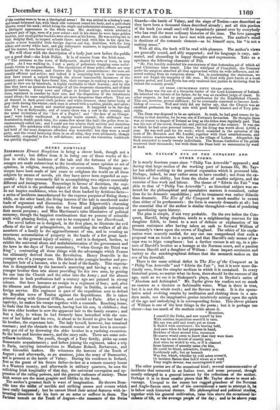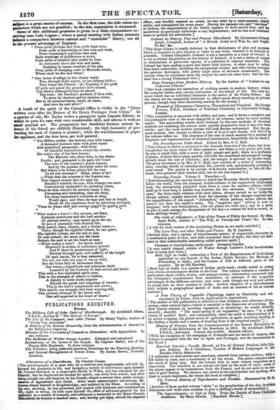MR. TAYLOR'S EVE OF THE CONQUEST AND OTHER POEMS.
IT is nearly fourteen years since "Philip Van Artevelde" appeared ; and during that large section of the working part of human life, Mr. Tay- lor has added nothing to the poetical reputation which it procured him. Perhaps, indeed, he may rather seem to have receded ; not from the ex- hibition of less ability, but from the choice of smaller subjects, and the exercise of less work and labour. The theme of "Edwin the Fair" was akin to that of " Philip Van Artevelde" ; an historical subject was se- lected for the philosophical and speculative matters it contained, rather than for its dramatic capabilities ; and its treatment was rather didactic than dramatic. The Eve of the Conquest is much smaller in extent than either of its predecessors : the form is scarcely dramatic at all ; but the essential idea of the author is similar-throughout—that of pondering or speculating upon history.
The plan is simple, if not very probable. On the eve before the Con- quest, Harold, being sleepless, sends to a neighbouring convent for his daughter Edith, to listen to a sort of defence or explanation of his present resistance after having taken an oath to forward William of Normandy's views upon the crown of England. The ethics of his expla- nation were scarcely needed, for any one can comprehend that such a proposal was an insult to a patriot, and that Harold's only means of es- cape was to feign compliance: but a further excuse is set up, in a pic- ture of Harold's brother as a hostage at the Norman court, and a passion between Harold and a daughter of William : these impart sentiment and variety to the autobiographical defence that the monarch makes on the eve of his downfall.
There is the same critical defect in The Eve of the Conquest as in "Philip Van Artevelde" and "Edwin the Fair "; but it is now more dis- tinctly seen, from the simpler medium in which it is contained. In every historical poem, no matter what its form, there should be the essence of the age, such as we see it in Shakspere's plays, and in Dryden's satire of " Absolom and Achitophel." Mr. Taylor gives his readers not so much an essence as a tincture or fashionable water. What is there is true, but it is not the whole truth ; and the flavour is weak. It is the specu- lative mind evolving results by meditation and clothing them in a mo- dern mode, not the imaginative genius intuitively seizing upon the spirit of the age and embodying it in corresponding forms. This clever picture of William is one of the best things in the poem ; but it is perhaps too clever—has too much of the modern critic about it.
" Meantime,
I search'd the Duke, and saw myself by him With subtlest inquisition search'd in turn. His eye was cold and cruel; yet at times It flash'd with merriment: his bearing bold, And save when he had purposes in hand, Reckless of those around him, insomuch He scarce would seem to know that they were there. Yet was he not devoid of courtly arts; And when he wish'd to win, or if it chanced Some humour of amenity came o'er him, He could be bland, attractive, frankly gay, Insidiously soft; but ay beneath Was fire, which, whether by cold ashes screen'd, Or lambent flames that lick'd whom at a word They might devour, was unextinguish'd still."
The other poems are of the occasional kind ; several commemorative of incidents that occurred in an Italian tour, and some personal, though mostly enlarged to a general interest by the reflections of the author. Perhaps it is in these smaller pieces that Mr. Taylor shows to most ad- vantage. Unequal to the massy but rugged grandeur of the Norman and Anglo-Saxon men, and of too conventional a taste to attempt it, he is below such historical themes. His philosophical and political studies, together with his general cultivation, raise him above the occasional in- cidents of life, or the average people of the day; and to be above your
'abject is a great source of success. In the first case, the title raises ex- pectations which are not gratified ; in the last, expectation is surpassed. Some of this additional greatness is given to a little circumstance oc- curring near Lake Lugano ; where a casual meeting with Italian peasants induces a comparison between natural and " statutable" liberty, not all to the present advantage of England.
" From pride plebeian and from pride high-born,
From pride of knowledge no leas vain and weak, From overstrain'd activities that seek Ends•worthiest of indifference or scorn, From pride of intellect that exalts its horn In contumely above the wise and meek, Exulting in coarse cruelties of the pen, From pride of drudging souls to Mammon sworn,
Where shall we flee and when?
" One house of refuge in this dreary waste
Was, through God's mercy, by our fathers built—
That house the Church : oh, England, if the guilt Of pride and greed tby grandeur have abased, Thy liberty endanger'd, here be placed Thy tract: thy freedom's garment, if thou wilt,
To piece by charters and by statutes strive, But to its personal rescue, haste, oh haste,
And save its soul alive I" A touch of the spirit of the Colonial Officels visible in the " Lines written soon after the"Return of Sir Henry Pottinger from China." in a species of ode, Mr. Taylor writes a panegyric upon Captain Elliott; in which he puts his case with very considerable skill, and adorns it with no small poetical art. The preparatory but thankless because unseen la- bours of his friend are skilfully illustrated ; the high humanity of pre- venting the sack of Canton is praised ; while the worthlessness of popu- lar applause, and the true hero, are well painted.
" The Million smiles; the taverns ring with toasts; A thousand journals teem with good report And plauditory paragraph; with hosts Of thankful deputations swarm the streets; His native city of her hero boasts;
The Minister who chose him, in the choice Exults; and, prompted to its par;,, the Court The echo of the country's praise repeats,
And by the popular pitehpipe tunes its voice. i
But where is he whose genius led the way
To all this triumph ? Elliot, where is he?
—When first the monsterof the Eastern sea, That hugest empire that for ogee lay
Becalm'd beneath the sun, with strange see-saws Convulsively nnsheath'd its quivering claws, 'Twos be that watch'd its motions many a day, Foreseeing and foretelling, that the sleep, For them uunumber'd centuries so deep, Would pass; and when its rage and fear at length Shook off the numbness from its labouring strength, 'Twos he whose skill and courage gaged its gaping jaws.
tie
" What makes a hero?—Not success, not fame, Inebriate merchants and the loud acclaim
Of glutted avarice, caps tossed npia the air,
Or pen of journalist with flourish fair, Bells pealed, stars, ribands, and a titular name,— These, though his rightful tribote,:he can spare; His rightful tribute, not Fend or aim,
Or true reward; for never yet did' these
,Refresh the soul or set the heart at ease.
—What makes a hero? An heroic mind
Express'd in action, in endurance proved: And if there be preiminence of Tight, Derived through pain well stiffed,' to the height Of rank heroic, 'tis to bear unmoved, Not toil, not risk, not rage of sea or wind, Not the brute fury of barbarians blind, But worse,--ingratitude and poisonous darts Launch'd by the Country he had served and loved: This with a free unelovided• spint pure, This in the strength of silence to endure, A dignity to noble deeds imparts
Beyond the gands and trappings of renown :
This is the hero's complement and crown; This mised, one struggle had been wanting still, • One glorious triumph of the heroic.will, One self-approval in his heart of hearts."



































 Previous page
Previous page